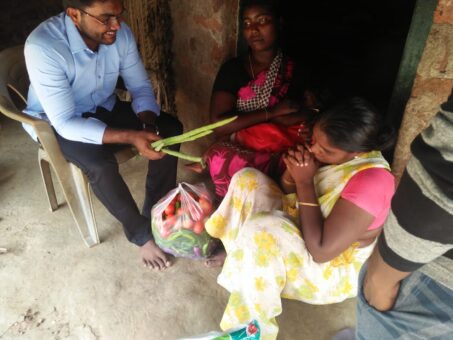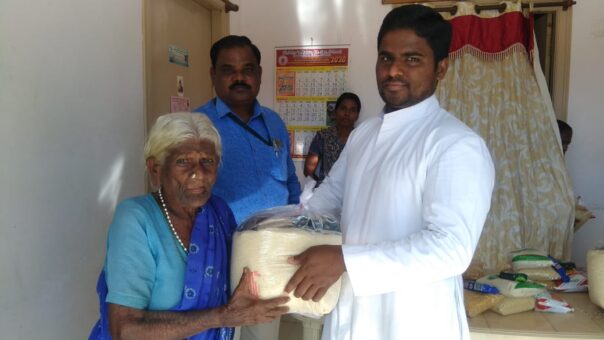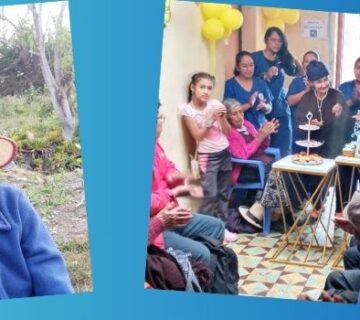The experience of a community in Bangalore, India, during the covid-19 lockdown.
What do you do when you suddenly find that everything is closed for three weeks and you don’t know what the near future will be like? What do you do when the work that has kept you going up until now ends and you don’t know if it will start again? I think this is an experience that is not limited to India at the moment but is being lived by many people in different countries all over the world. The Italians, unfortunately, were the first to experience this sense of bewilderment and now here in India we are in the same situation. However, here, as you may have seen on the news, there are 450 million people who work as day labourers, without any security, and most of them without any savings. Therefore, not being able to go to work means eating less every day and trying to survive.
 The Focolare community in Bangalore asked themselves how they could help people in need and how they could involve others people who were at home during lockdown. It all started with a WhatsApp message that someone in the community sent to Kiran who is a seminarian and lives in a village we visited a while ago. “Are there families in need in your village?” we asked. The village, which is in the Indian state of Andhra Pradesh, has a population of about 4560 families of which about 450 are Catholic. That same evening, Kiran (which means “ray” in the local language) had been out walking and visited various families who had confided in him and spoken about their fears for the future. They were already eating kanji (boiled rice with lots of water: you eat green chili pepper with it to give it some taste) and did not know what they would do during the 21 days of lockdown. It’s not normal for adults to talk to a young person about their problems and so Kiran had come home feeling worried. When he looked at his phone and saw the message, he realized that God was giving him a solution for those families who needed help. And so, we set to work.
The Focolare community in Bangalore asked themselves how they could help people in need and how they could involve others people who were at home during lockdown. It all started with a WhatsApp message that someone in the community sent to Kiran who is a seminarian and lives in a village we visited a while ago. “Are there families in need in your village?” we asked. The village, which is in the Indian state of Andhra Pradesh, has a population of about 4560 families of which about 450 are Catholic. That same evening, Kiran (which means “ray” in the local language) had been out walking and visited various families who had confided in him and spoken about their fears for the future. They were already eating kanji (boiled rice with lots of water: you eat green chili pepper with it to give it some taste) and did not know what they would do during the 21 days of lockdown. It’s not normal for adults to talk to a young person about their problems and so Kiran had come home feeling worried. When he looked at his phone and saw the message, he realized that God was giving him a solution for those families who needed help. And so, we set to work.
Kiran knew how many families were in trouble. We prepared a message to send to all the people we know, with details and information about where to send help. Our target was to help at least 25 families by providing a 25 kg bag of rice and a bag of vegetables – enough food for a family for about two weeks. This would cost about 1500 rupees, about 20 euros.
 The response was immediate. Many people participated – families and many young people. Some gave a thousand rupees, others three thousand, and others five thousand rupees. Within a few days we reached the target set. But the contributions continued and so we were able to help more than 30 families. There was an average of four people per household and so this support has reached at least 120 people.
The response was immediate. Many people participated – families and many young people. Some gave a thousand rupees, others three thousand, and others five thousand rupees. Within a few days we reached the target set. But the contributions continued and so we were able to help more than 30 families. There was an average of four people per household and so this support has reached at least 120 people.
However, there are many other villages where people we know are in need and so we started to help in other places too. Now there are three villages that we are supporting. We always work in collaboration with local people who know the situation well and know how to help in the most appropriate way.
Chiara Lubich taught us to love people one by one and it seems we are doing just this: we are trying to love one village at a time, but without stopping!
What we are doing is very small – it’s only a drop in the ocean – but many people have become involved. Here in the diocese of Bangalore, the Archbishop has worked extremely hard to help workers blocked in the area due to the lockdown. We have also collaborated in this initiative.
Now Bangalore is asking Mumbai, New Delhi and Goa to take up the challenge and do everything possible to help circulate whatever we have so that no one is in need. We are all realizing that, in the end, everything passes and all that remains is the love we share: this love fills our hearts.
The Focolare community Bangalore, India


 Italiano
Italiano Español
Español Français
Français Português
Português




GRAZIE!!!